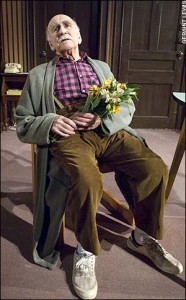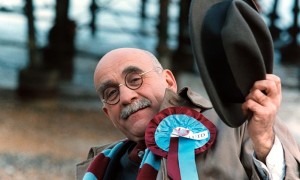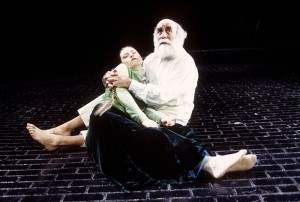In 2008 I interviewed the veteran actor Warren Mitchell, who died yesterday (November 14) at the age of 89, ahead of his final West End appearance in a play called VISITING MR GREEN that came to London’s Trafalgar Studios. That performance was described by Charles Spencer in a review for the Daily Telegraph as “unmissable”.
 As Charlie beautifully wrote, “His face has acquired the look of wise, curious tortoise, albeit a tortoise with a bristling moustache, and he certainly hasn’t lost that knack for testy irritation that was such a feature of his performance in Till Death Us Do Part. His comic timing is spot-on, and he has an astonishingly touching old man’s gait, half weary shuffle, half hopeful skip. Best of all are the actor’s moments of sudden tenderness, when Mitchell seems to be living the role rather than acting it. For those seeking subtle, deeply-felt acting in old age, Mitchell’s beautifully judged performance is unmissable.”
As Charlie beautifully wrote, “His face has acquired the look of wise, curious tortoise, albeit a tortoise with a bristling moustache, and he certainly hasn’t lost that knack for testy irritation that was such a feature of his performance in Till Death Us Do Part. His comic timing is spot-on, and he has an astonishingly touching old man’s gait, half weary shuffle, half hopeful skip. Best of all are the actor’s moments of sudden tenderness, when Mitchell seems to be living the role rather than acting it. For those seeking subtle, deeply-felt acting in old age, Mitchell’s beautifully judged performance is unmissable.”
Here’s my interview with the great actor, posted in its unedited form (it was published in the SUNDAY EXPRESS, but I no longer have whatever was done to it!)
***
VISITING MR MITCHELL
Mark Shenton visits Warren Mitchell at his new North London home, as he prepares to return to the West End once again in Visiting Mr Green.
“This is the house that Alf built”, says Warren Mitchell when we meet at the North London home that he and his wife of 56 years, Connie, have just recently moved into. It’s a brand-new build, and has been constructed right next door to the house they used to live for about 40 years on the fringes of Hampstead Heath. He is now 82, and ushering me into the lounge, he adds, “We are now sitting on the serving line of what used to be the tennis court.”
He used to be a keen tennis player and even now he still has serious sporting ambitions, even if he realises they are a bit ambitious: “I would love to sail around the world – sailing is my grand passion, but I probably never will now. You’ve got to be rather skilful at mending things that break, and I’m not very good at that.”
Right now, things that don’t work are troubling him: Connie comes in to say that the coffee pot is in the dishwasher and it is mid-cycle, so we’ll have to have tea instead. “We’re held up by gadgets where ever we turn in this house – we don’t know how to operate almost anything. I can’t get Sky Sports, and I want to watch it this afternoon but I can’t!”
But that’s not the worst of it. About 18 months ago, he suffered a stroke, “and I haven’t really made much of a recovery yet.” Yet this Tuesday he opens in the West End in a play called Visiting Mr Green, and visiting Mr Mitchell today, he is looking on the bright side of things: “The part I play is that of a man who has been knocked over by a car, so that’s lucky!” He can use his own infirmity to portray the character’s. And he says, he has hardly stopped despite it: “After the stroke, I went straight back to rehearsal, and to a certain extent it was therapeutic – instead of worrying and thinking and being sorry for myself, I had to get up and go to work.” Were the lines still there? “Some were, but not many – I had to bash them in again.”
That was for an earlier run of this play, which he has been doing on and off for nearly a decade – he did it first in Leeds back in 1999, and has also toured with it in Australia.  Till Death Do Us Part’s Alf Garnett (pictured left) again makes an appearance when we talk about those times: “The money to build this house came from standing up in clubs in Australia and doing my jokes as Alf – it was quite lucrative for a while”.
Till Death Do Us Part’s Alf Garnett (pictured left) again makes an appearance when we talk about those times: “The money to build this house came from standing up in clubs in Australia and doing my jokes as Alf – it was quite lucrative for a while”.
He is grateful to Alf for some things: “Connie and I will probably have a reasonably comfortable retirement, much of it because of Alf.” Not that he’s thinking of retiring any time soon. And it has sometimes proved difficult being too closely associated with such a bigoted, reactionary character, especially when members of the public have actually applauded him for his character’s views: “I had a bloke come up to me at Tottenham one day and he said, I love that show of yours, Alf, you know, when you have a go at the coons. I said, actually, we’re having a go at idiots like you. There’s not much you can do about it, if they’re stupid enough to believe it.”
He’s also done a lot of serious stage work, too, including acclaimed, award-winning runs in plays by Arthur Miller and Harold Pinter at both the National Theatre and in the West End, and has played the title role of King Lear in Australia that he later brought to London (pictureed left) . “It was a mountain to climb, but easier than I thought. People said to me, how could you banish your daughter from the house like he does, it is so heartless – but I replied, I have two daughters, and they get banished once a week!” He says this with a mischievous glint in his eye, but he’s obviously a fond family man: later that day, he was going to be seeing them both. The youngest, Georgia Mitchell, is an actress; the eldest, Rebecca, is a probation officer who is training to be a psychiatric counsellor. His middle child, Daniel, is also an actor who now lives in Australia – and coincidentally starred in this play with him when he did it there.
. “It was a mountain to climb, but easier than I thought. People said to me, how could you banish your daughter from the house like he does, it is so heartless – but I replied, I have two daughters, and they get banished once a week!” He says this with a mischievous glint in his eye, but he’s obviously a fond family man: later that day, he was going to be seeing them both. The youngest, Georgia Mitchell, is an actress; the eldest, Rebecca, is a probation officer who is training to be a psychiatric counsellor. His middle child, Daniel, is also an actor who now lives in Australia – and coincidentally starred in this play with him when he did it there.
What was appearing with him like? “It was great – if he didn’t do as I told him, I just said go to your room and don’t out till I tell you! I had a bit of business I got very attached to, and he said, ‘dad, if it gets any longer, I’m going to walk off’. I said, ‘if you do, you’ll be sorry!”
The play is a two-hander in which Mitchell plays an elderly man who is almost hit by a speeding car driven by a young corporate executive – who, after being found guilty of reckless driving, is ordered to make amends by paying weekly visits to his victim. What attracted him to do it? “It’s a nice big part – it was lip-smacking, and I thought I could get my teeth and old lips into it! And the money wasn’t good but it wasn’t bad, either!”
He has toured with it extensively before coming to London, and says, “I’ve always felt that actors should go out to the provinces – not that I enjoy the average English country hotel; they’re shocking, and as for facilities for disabled people, forget it.” In his new house, he’s made sure that such facilities have been provided: “We put a lift in for the old fella, which is very handy.”
He and Connie also have a house in the country in Suffolk, and he says, “Connie adores it – mostly to get away from me! She finds it an absolute sanctuary.” Is he that difficult? “As an invalid, I’m very difficult,” he admits frankly. “I don’t like being ill.” But he fights it, too: “I have to nurse myself a bit, due to my age and illnesses. But I get up and try to do some yoga every day, to push myself a little bit physically.” And then, every evening, he pushes himself mentally, too, as he takes to the stage once again. “Theatre is a very big part of my life. I love it – I like the idea of getting up in the morning and knowing that you’ve got to go to work that night.”

